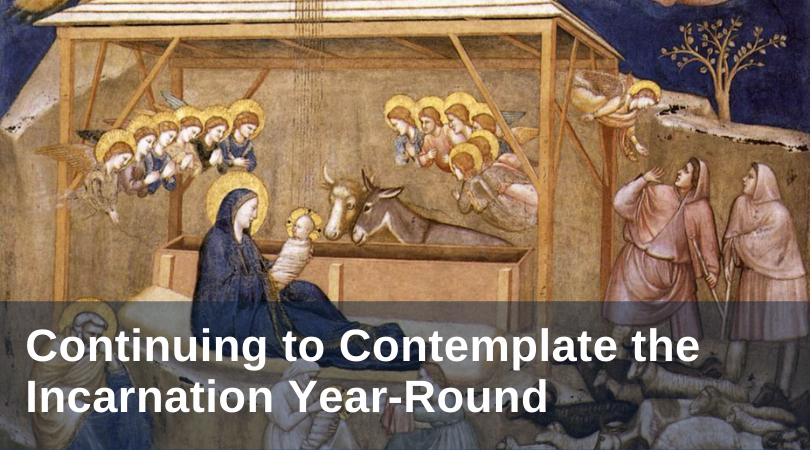
The end of the Christmas season is fast approaching, but the Incarnation is a mystery that we should contemplate all year. The Gospels of the Christmas liturgies are a beautiful way to help us do this, so let’s take a look at each of them in turn as a way to keep the Incarnation in our hearts as we prepare to return to Ordinary Time.
The Gospel reading that you heard on Christmas inevitably depended on which Christmas Mass you attended. There are four different Christmas liturgies, and they each have a different Gospel reading. Christmas, along with the Christmas Octave, focuses our contemplation on the mystery of the Incarnation, so we can continue our contemplation by exploring key themes from each of the Christmas Gospel readings. What key insights do these readings have to nourish our reflection on the Incarnation?
Christmas Vigil Mass (Matthew 1:1–25)
The Incarnation is born of God’s fidelity and mercy.
When it comes to the genealogy of Jesus, the very first passage of the New Testament, it is both one of the most overlooked and one of the most vital New Testament passages. The genealogy is an optional portion of the Vigil Mass reading, but as Raymond Brown observed, it “contains the essential theology of both the Old and New Testaments” (Christ in the Gospels of the Liturgical Year, 53). The genealogy is not a list of difficult to pronounce and obscure names. Rather, it is an exquisite articulation of salvation history. From Abraham to David and then to Jesus, and each generation in between, God’s covenant faithfulness endures. This fidelity is made manifest in the Incarnation—the infant to be born of the virgin (Matthew 1:23; see also Isaiah 7:14).
Jesus, the angel tells Joseph, “will save his people from their sins” (Matthew 1:21). Salvation, then, unfolds anew with the Incarnation, the physical in-breaking of divine mercy. This mercy pours over us, and our sins are washed away by Emmanuel, “God is with us.”
Christmas Mass During the Night (Luke 2:1–14)
The Incarnation is earthy.
The Incarnation did not take place in Jerusalem, the holy city. Nor did it take place in the Temple Tabernacle, the holy of holies. Jesus was born in a small town to the south, Bethlehem. That angels then appeared to shepherds is not insignificant. The Incarnation is not announced to the religious or social elites, it is first announced to the poor, to shepherds tending their flock at night. This is not so much the romantic image that we have come to know in Nativity scenes. Rather, shepherds were often looked on with suspicion and regarded as dishonest in antiquity. God has seen to it, however, that the news of Jesus’ birth is sung first, not to the deeply religious, but to those at the bottom of the societal ladder.
A further indication of the earthiness of the Incarnation is when Jesus is laid in a manger. The sweet images in the Christian imagination of the swaddled infant Jesus are enhanced by depictions of perfectly arranged hay spilling over the edges of the well constructed bed where Jesus lies. But this isn’t the full picture. As gentle and pleasant as the word ‘manger’ sounds to our ears, the place Jesus was laid was in a feeding-trough. Few places are more earthy than a feeding-trough, and the One who is laid in the manger, he who has consummated all creation, will eventually give his Body as our food and his Blood as our drink in the Eucharist.
Christmas Mass at Dawn (Luke 2:15–20)
The goodness of the Incarnation begs to be shared and contemplated.
Having heard the amazing message from the angels (Luke 2:9–14), the shepherds immediately seek out the Child. Upon their arrival they share the Good News delivered to them about Jesus, and everyone was amazed. Mary’s response was unique: she “kept all these things, reflecting on them in her heart” (Luke 2:19). In the Christmas Octave we continue in the joy of Christmas, contemplating the mystery of the Incarnation as Mary once contemplated the news shared by the shepherds. This propels us to share the Good News with the same eagerness of the shepherds.
Christmas Mass During the Day (John 1:1–18)
The Incarnation changes everything.
This might sound like a platitude, but it is nevertheless true: the Incarnation changes everything. It is the radical new presence of God on earth. God became flesh: God did not temporarily appear as though he was enfleshed. God became flesh, and the union of divinity-temporality, spirit-flesh, creator-creation becomes an unbreakable bond, sanctifying all that is. God dwelt among us: no longer would the Temple be the site of God’s presence on earth, but the person of Jesus was the very site of divine presence. The Incarnation turns the order of the world on its head through the radically new presence of God among us.
Throughout these Christmas Gospel readings we hear different emphases regarding the newborn Jesus and the mystery of the Incarnation. No one of these readings exhausts what is communicated by the other readings. In fact, we need to hear from each of them. We do well to imitate the faith of Mary, and reflect on these things in our hearts during this Christmas Octave.
Like what you read? Submit your email below to have our newest blogs delivered directly to your inbox each week.
Featured image: Nativity of Jesus by Giotto di Bondone; PD-OLD.


